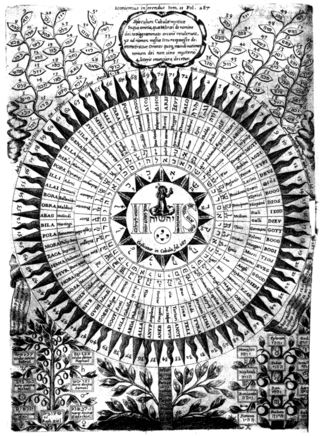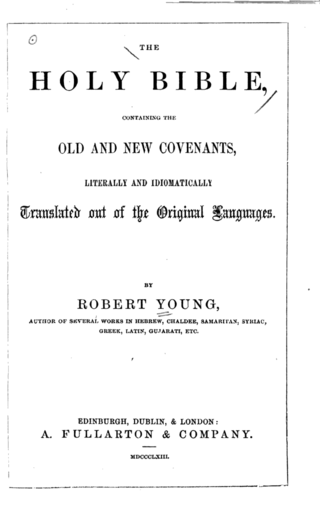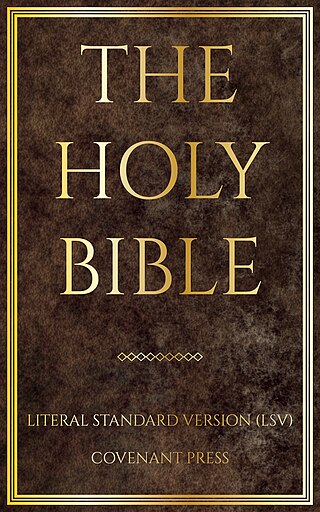Related Research Articles

The New World Translation of the Holy Scriptures (NWT) is a translation of the Bible published by the Watch Tower Bible and Tract Society; it is used and distributed by Jehovah's Witnesses. The New Testament portion was released first, in 1950, as The New World Translation of the Christian Greek Scriptures, with the complete New World Translation of the Bible released in 1961.
Jah or Yah is a short form of יהוה (YHWH), the four letters that form the tetragrammaton, the personal name of God: Yahweh, which the ancient Israelites used. The conventional Christian English pronunciation of Jah is, even though the letter J here transliterates the palatal approximant. The spelling Yah is designed to make the pronunciation explicit in an English-language context, especially for Christians who may not use Hebrew regularly during prayer and study.

The Bible has been translated into many languages from the biblical languages of Hebrew, Aramaic, and Greek. As of September 2023 all of the Bible has been translated into 736 languages, the New Testament has been translated into an additional 1,658 languages, and smaller portions of the Bible have been translated into 1,264 other languages according to Wycliffe Global Alliance. Thus, at least some portions of the Bible have been translated into 3,658 languages.
Partial Bible translations into languages of the English people can be traced back to the late 7th century, including translations into Old and Middle English. More than 100 complete translations into English have been produced. A number of translations have been prepared of parts of the Bible, some deliberately and some projects have been abandoned.

There are various names of God, many of which enumerate the various qualities of a Supreme Being. The English word god is used by multiple religions as a noun to refer to different deities, or specifically to the Supreme Being, as denoted in English by the capitalized and uncapitalized terms God and god. Ancient cognate equivalents for the biblical Hebrew Elohim, one of the most common names of God in the Bible, include proto-Semitic El, biblical Aramaic Elah, and Arabic ilah. The personal or proper name for God in many of these languages may either be distinguished from such attributes, or homonymic. For example, in Judaism the tetragrammaton is sometimes related to the ancient Hebrew ehyeh. It is connected to the passage in Exodus 3:14 in which God gives his name as אֶהְיֶה אֲשֶׁר אֶהְיֶה, where the verb, translated most basically as "I am that I am" or "I shall be what I shall be", "I shall be what I am" In the Hebrew Bible, YHWH, the personal name of God, is revealed directly to Moses. Correlation between various theories and interpretation of the name of "the one God", used to signify a monotheistic or ultimate Supreme Being from which all other divine attributes derive, has been a subject of ecumenical discourse between Eastern and Western scholars for over two centuries. In Christian theology the word is considered a personal and a proper name of God. On the other hand, the names of God in a different tradition are sometimes referred to by symbols. The question whether divine names used by different religions are equivalent has been raised and analyzed.

The Recovery Version is a modern English translation of the Bible from the original languages, published by Living Stream Ministry, ministry of Witness Lee and Watchman Nee. It is the commonly used translation of Local Churches (affiliation).

Young's Literal Translation (YLT) is a translation of the Bible into English, published in 1862. The translation was made by Robert Young, compiler of Young's Analytical Concordance to the Bible and Concise Critical Comments on the New Testament. Young used the Textus Receptus (TR) and the Masoretic Text (MT) as the basis for his translation. He wrote in the preface to the first edition, "It has been no part of the Translator's plan to attempt to form a New Hebrew or Greek Text—he has therefore somewhat rigidly adhered to the received ones." Young produced a "Revised Version" of his translation in 1887, but he stuck with the Received Text. He wrote in the preface to the Revised Edition, "The Greek Text followed is that generally recognized as the 'Received Text,' not because it is thought perfect, but because the department of Translation is quite distinct from that of textual criticism, and few are qualified for both. If the original text be altered by a translator, the reader is left in uncertainty whether the translation given is to be considered as that of the old or of the new reading." A new Revised Edition was released ten years after Robert Young's death on October 14, 1888. The 1898 version was based on the TR, easily confirmed by the word "bathe" in Revelation 1:5 and the word "again" in Revelation 20:5. The "Publishers' Note to the Third Edition" explains, "The work has been subjected to a fresh revision, making no alteration on the principles on which the Translation proceeds, but endeavouring to make it as nearly perfect in point of accuracy on its present lines as possible."
The Julia Evelina Smith Parker Translation is considered the first complete translation of the Bible into English by a woman. As of 2017, she is still the only woman to have translated the entire Bible unaided. The Bible was titled The Holy Bible: Containing the Old and New Testaments; Translated Literally from the Original Tongues, and was published in 1876.
The Darby Bible refers to the Bible as translated from Hebrew and Greek by John Nelson Darby.
Yahshua is a proposed transliteration of יהושוע, the original Hebrew name of Jesus. The pronunciation Yahshua is philologically impossible in the original Hebrew and has support neither in archeological findings, such as the Dead Sea scrolls or inscriptions, nor in rabbinical texts as a form of Joshua. Scholarship generally considers the original form of Jesus to be Yeshua, a Hebrew Bible form of Joshua.

Jehovah is a Latinization of the Hebrew יְהֹוָהYəhōwā, one vocalization of the Tetragrammaton יהוה (YHWH), the proper name of the God of Israel in the Hebrew Bible/Old Testament. The Tetragrammaton יהוה is considered one of the seven names of God in Judaism and a form of God's name in Christianity.
In contrast to the variety of absolute or personal names of God in the Old Testament, the New Testament uses only two, according to the International Standard Bible Encyclopaedia. From the 20th century onwards, "a number of scholars find various evidence for the name [YHWH or related form] in the New Testament.
Messianic Bible translations are translations, or editions of translations, in English of the Christian Bible, some of which are widely used in the Messianic Judaism and Hebrew Roots communities.

The Tetragrammaton, or the Tetragram, is the four-letter Hebrew theonym יהוה, the name of God in the Hebrew Bible. The four letters, written and read from right to left, are yodh, he, waw, and he. The name may be derived from a verb that means "to be", "to exist", "to cause to become", or "to come to pass". While there is no consensus about the structure and etymology of the name, the form Yahweh is now accepted almost universally, though the vocalization Jehovah continues to have wide usage.
Jay Patrick Green Sr. was an ordained minister, Bible translator, publisher, and businessman.

The Sacred Scriptures Bethel Edition (SSBE) is a Sacred Name Bible which uses the names Yahweh and Yahshua in both the Old and New Testaments. It was produced by Jacob O. Meyer, based on the American Standard Version of 1901 and it contains over 977 pages. The Assemblies of Yahweh printed 5,500 copies of the first edition in 1981. It is also used by some members of the Sacred Name Movement.

Sacred Name Bibles are Bible translations that consistently use Hebraic forms of the God of Israel's personal name, instead of its English language translation, in both the Old and New Testaments. Some Bible versions, such as the Jerusalem Bible, employ the name Yahweh, a transliteration of the Hebrew tetragrammaton (YHWH), in the English text of the Old Testament, where traditional English versions have LORD.

The Bible usually uses the name of God in the singular, generally using the terms in a very general sense rather than referring to any special designation of God. However, general references to the name of God may branch to other special forms which express his multifaceted attributes. The Old Testament reveals YHWH as the personal name of God, along with certain titles including El Elyon and El Shaddai. Jah or Yah is an abbreviation of Jahweh/Yahweh, and often sees usage by Christians in the interjection "Hallelujah", meaning "Praise Yah", which is used to give God glory. In the New Testament the terms Theos, Kyrios and Patēr are additionally used to reference God.

The Kingdom Interlinear Translation of the Greek Scriptures is an interlinear translation of the New Testament, published by the Watchtower Bible and Tract Society of New York, Inc. and translated by the New World Bible Translation Committee. The first edition was released at an international convention of Jehovah's Witnesses in 1969. As of the 1985 revision, 800,000 copies were produced.

The Literal Standard Version (LSV) is a Modern English translation of the protocanonical books of the Bible with a number of distinctive features. It describes itself as the most literal translation of the Bible into the modern English language. The first edition was published on February 2, 2020.
References
- ↑ Bond, Josh. "Bible Support" . Retrieved 10 December 2014.
- ↑ Books, SGP. "Sovereign Grace".
- ↑ Green, Jay P. Sr. "A Brief History and Testimony of Jay P. Green, Sr. Founder of Sovereign Grace Publishers, Inc" (PDF). Retrieved October 15, 2021.
- ↑ The purpose and plan of the Literal Translation of the Bible Archived 2007-08-07 at the Wayback Machine